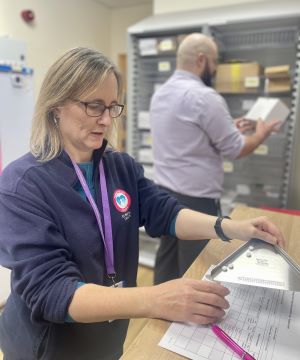Today is World Pharmacists Day (September 25), a day to recognize and celebrate the crucial role that pharmacists play in building healthier communities everywhere.
Pharmacists are integral to our health-care systems, often being the first point of contact for health advice and primary health care. They provide guidance on essential medicines as well as expertise for patient care and public health.
 In the case of clinical pharmacists at Frimley Health, they use their expert knowledge to ensure the delivery of research trials testing new and existing medicines.
In the case of clinical pharmacists at Frimley Health, they use their expert knowledge to ensure the delivery of research trials testing new and existing medicines.
“I think pharmacists, and other pharmacy staff, are some of the unsung heroes of research,” said Sue Holland (pictured), Lead Pharmacist for Clinical Trials at Frimley Park Hospital.
“We work hard behind the scenes to ensure that trial medicines are stored, dispensed and used correctly, and that trial regulations and guidance are always followed, so that patients, colleagues, and the Trust are safe and that the data from the trials is robust.”
A clinical pharmacist will assess the practicalities involved in a study, from whether the hospital has adequate storage for trial drugs, to maintaining an audit trail once the Trust receives the drug and identifying any clinical issues, such as if its use fits with existing patient care pathways.
“I think pharmacists in general are very good at that sort of thing, we are very pragmatic and detail orientated,” said Sue.
Part of the Trust for more than 25 years, Sue has been involved with research trials since 2007. She enjoys the opportunity to work with the latest drug innovations and see the difference a trial can make to patients by offering new options.
“Many of the trials we take part in are multinational and our data contributes to testing new therapies and them gaining licences not just in the UK but around the world,” she said.
“Other trials are looking at new ways of using existing therapies. For example, there are several trials we are taking part in, testing aspirin to prevent cancer. If proven effective this drug, which is cheap and readily available, would be easy and affordable for countries globally to roll out.
“To be part of that is really satisfying,” she said. “I’m proud to have been involved over the years in trials leading to various drugs gaining licenses and that are now standard of care treatments for our patients.”
Pharmacy had a big role to play in research during the Covid pandemic.
“We were crucial to rapidly setting up a number of Covid studies, including the big, pivotal Recovery and RemapCap trials, where we were faced with the challenge of these platform trials constantly evolving and having new drugs added in,” said Sue.
“Everything happened at a much quicker speed than normal, which was challenging at times but of course necessary to try and save lives. We worked closely with our pharmacy and clinical colleagues to roll out all the treatments, monitor the patients and collect the data for the trials. Our ICU and ward pharmacists’ input was invaluable at this time.”
She enjoys the variety that comes with clinical research.
“I like the science of it, it fascinates me. There’s a lot to keep you thinking, as you’re reading protocols, researching documents, liaising with the wider research team. You’re learning something all the time. Even after all my years in the role, I’m learning new things.
“Healthcare never stands still, and pharmacists, and pharmacy in general, have a big part to play. We do need to invest in facilities and staff time to be able to embed and facilitate research, though – it should really be a core part of all of our jobs and part and parcel of working in the NHS, otherwise how can we improve?
“We need data and robust evidence to advance. It does feel like there is a big push to try and improve research in the UK and make us a beacon of excellence. It really is an exciting time to be involved in research.”

